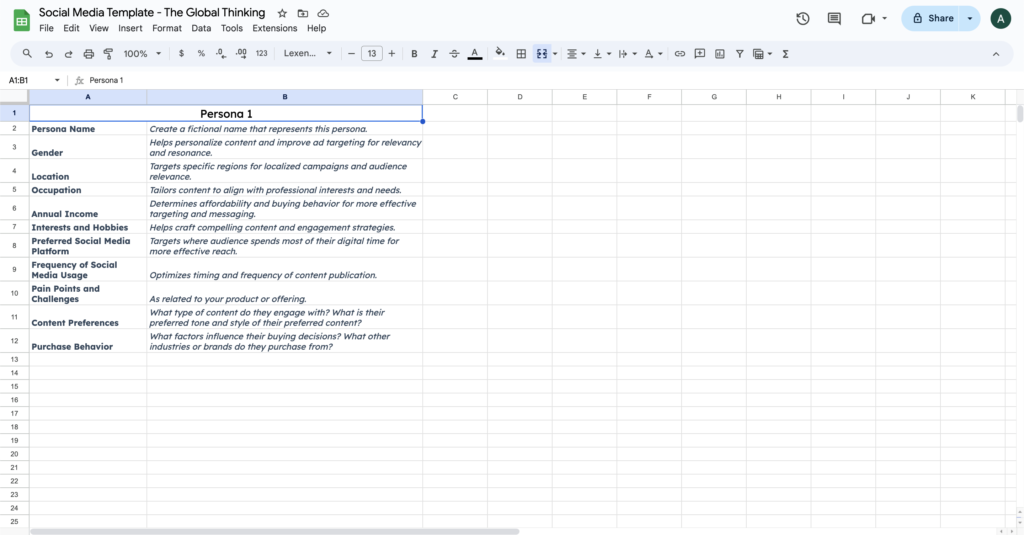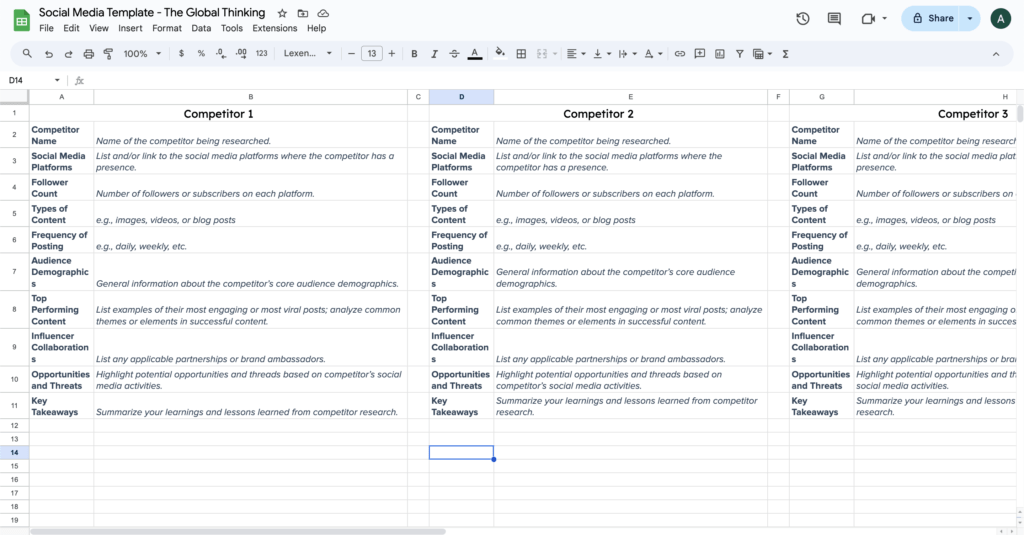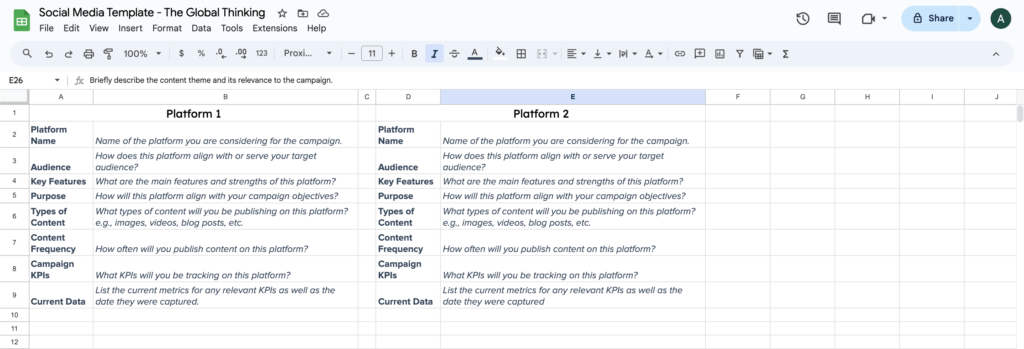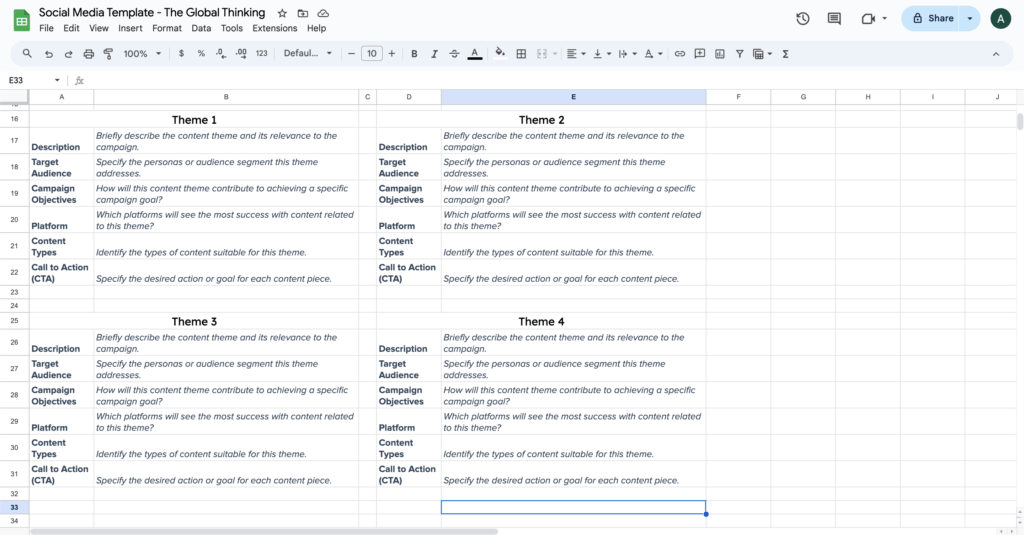From startups to established enterprises, a well-crafted social media strategy can drive significant growth, enhance brand awareness, and foster a loyal customer base. However, navigating the complexities of social media marketing can be daunting without a clear plan. This guide is designed to provide a comprehensive roadmap for businesses looking to harness the power of social media effectively.
Why You Should Use This Guide
- Strategic Planning: Learn how to set clear, achievable goals that align with your business objectives.
- Targeted Marketing: Understand your audience and competitors to create targeted campaigns.
- Platform Selection: Choose the right social media platforms to maximize your reach and impact.
- Content Creation: Develop a content strategy that resonates with your audience and drives engagement.
- Community Management: Build and maintain a loyal and active social media community.
- Performance Measurement: Use analytics to track your success and refine your strategy.
Who Should Use This Guide
- Small Business Owners: Looking to grow their online presence and customer base.
- Marketing Professionals: Seeking to enhance their social media campaigns and strategies.
- Entrepreneurs: Wanting to leverage social media for brand building and customer engagement.
- Social Media Managers: Needing a structured approach to plan and execute social media strategies.
Goal Setting
Establishing Goals and KPIs: Setting clear and measurable goals is the cornerstone of any successful social media strategy. Goals should align with your business objectives and overall marketing strategy. The S.M.A.R.T. framework (Specific, Measurable, Attainable, Relevant, and Time-bound) is an excellent tool for goal setting.

Example Goals:
- Increase Website Traffic: Boost website traffic by 25% through social media referrals within the first 90 days.
- Enhance Brand Awareness: Achieve 10,000 impressions on your campaign hashtag within the next 30 days.
Determine KPIs: Key Performance Indicators (KPIs) are quantifiable metrics used to gauge the success of your strategy. Common KPIs include:
- Number of website visits from social profiles
- Number of followers gained
- Number of shares and comments per post
Example KPIs:
- Reach (e.g., 500,000 unique users reached during the campaign period)
- Engagement (e.g., 5,000 likes, comments, and shares combined during the campaign period)
- Click-Through-Rate (CTR) (e.g., 3% of total audience clicks on campaign CTA link during the campaign period)
Audience and Competition Analysis
Target Audience Identification: Understanding your audience is critical. Define your target audience’s demographics, interests, and social media usage. Create detailed personas to guide your content creation and ad targeting.

Example Persona:
- Name: Social Sally
- Gender: Female
- Location: Urban areas
- Occupation: Marketing professional
- Interests: Social media trends, digital marketing tools
Competitor Research: Analyzing your competitors provides insights into effective strategies and potential pitfalls. Identify three key competitors and evaluate their social media presence, content types, audience engagement, and top-performing posts.

Selecting the Right Platforms
Choosing the right social media platforms is crucial for maximizing your reach and impact. Consider your target audience, available resources, and competitors’ presence.

Platform Selection:
- Platform 1: Facebook
- Audience: Broad, diverse demographic
- Key Features: Groups, Ads, Marketplace
- Content Types: Images, videos, blog posts
- Content Frequency: Daily
- KPIs: Engagement, Reach, CTR
- Platform 2: LinkedIn
- Audience: Professionals, B2B
- Key Features: Job postings, professional groups
- Content Types: Articles, professional updates, infographics
- Content Frequency: Weekly
- KPIs: Follower growth, Engagement, CTR
Developing Your Content Strategy
A well-defined content strategy is essential for engaging your audience and achieving your campaign goals. Your strategy should include a mix of content themes and types tailored to your audience’s preferences and needs.

Content Themes:
- Theme 1: Industry Insights
- Description: Share industry trends and news
- Target Audience: Marketing professionals
- Campaign Objectives: Establish thought leadership
- Platforms: LinkedIn, Twitter
- Content Types: Articles, infographics
- CTA: Read more, Share
- Theme 2: Customer Success Stories
- Description: Highlight customer achievements and testimonials
- Target Audience: Potential customers
- Campaign Objectives: Build trust and credibility
- Platforms: Facebook, Instagram
- Content Types: Videos, case studies
- CTA: Contact us, Learn more
Engagement and Community Management
Building and maintaining an active and engaged community is vital for long-term success on social media. Implement strategies to encourage interaction and manage your community effectively.
Engagement Strategies:
- Content Interactions: Actively respond to likes, comments, and shares.
- Comment Moderation: Handle negative comments constructively.
- User Engagement: Encourage content sharing and participation through polls and surveys.
- User-Generated Content (UGC): Share and highlight user-generated content to build community loyalty.
Analytics and Measurement
Regularly analyzing your social media performance helps refine your strategy and improve results. Use analytics tools to track your KPIs and gain insights into user behavior.
Social Media Metrics Tracker: Maintain a tracker to monitor key metrics like followers, engagements, views, and CTR across platforms.
Social Media Audit: Conduct regular audits to evaluate the performance of your social media accounts and identify areas for improvement. Assess the effectiveness of your engagement strategies, content types, and overall campaign success.

Emerging Trends: Stay updated with emerging social media trends and features to keep your strategy relevant and effective.
Conclusion
By following this comprehensive guide, you can develop a strategic and effective social media plan that drives engagement, builds community, and achieves your marketing goals. Remember, the key to success lies in setting clear goals, understanding your audience, creating valuable content, and continuously measuring and refining your strategy.




![[TEMPLATE] Choosing the Right Code Collaboration Tool: Streamline Your Tool Selection Process 16 template to choose the right collaboration tools](https://theglobalthinking.com/wp-content/uploads/2024/09/template-collobaration-tools-506x380.png)